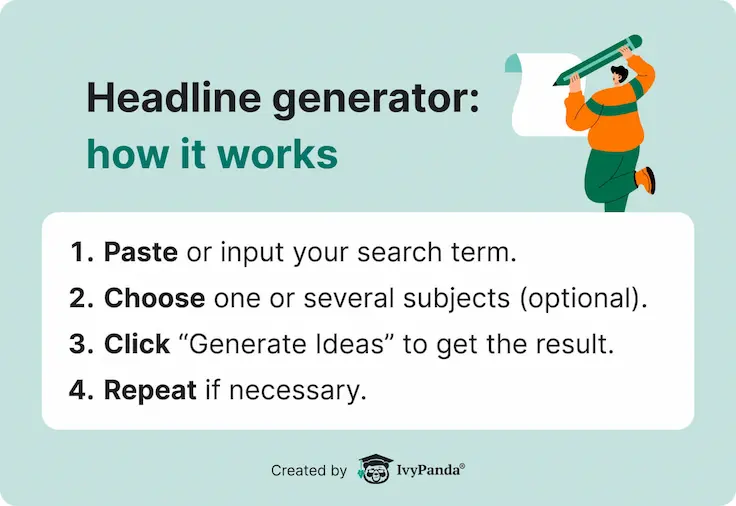Free Headline Generator for Students
If you’re looking for a catchy essay headline, you’re in the right place. The free headline generator for students made by IvyPanda will help you make a compelling header in seconds.
🤔 Headline Generator: Who Is It for?
A headline generator is primarily designed to assist students with formulating their essay headers. However, its usefulness extends well beyond educational and academic settings.

Let's explore who can benefit from using the tool:
- Students struggling to formulate catchy headers can rely on it for their essays, research papers, theses, and term papers.
- Educators can use the headline generator whenever they need help making memorable names for their workshops and presentations.
- Researchers can turn to it to generate compelling headlines for journal submissions and conference speeches.
- Content creators might use the free headline generator to brainstorm meaningful, SEO-friendly ideas for their blog articles, videos, and podcasts.
- Business owners who need to develop headers for their press releases and promotional materials will also be inspired by the headline maker.
🔢 Catchy Headline Generator: How It Works
To get a compelling header, take the following steps:
- Enter the search term or terms. Type in or paste the keywords for your search (up to 200 characters).
- Choose the subject or subjects (optional). Select one or several subjects from our list to refine the result.
- Click “Generate Ideas” and get a list of ideas.
- Repeat if necessary.
✍️ How to Make a Headline in 5 Steps
A catchy headline is the first thing your reader will notice, whether it’s an essay, blog post, or presentation. That’s why it makes sense to invest your energy into creating a clear, relevant, and engaging heading.
Here’s how to do that:
- Identify the main topic. Start by formulating the central message you’re aiming to convey. Your headline should reflect that message. Note that you can craft your headline at any stage of your work. However, it’s often easier to do it once the bulk of the material is ready.
- Find the keywords. You should typically use at least two or three key terms in your headline to clarify what you're about. This step is crucial if you're targeting an online audience. Adding keywords related to your topic will make the header more search-friendly.
- Think of your audience. Who are your readers or listeners? What’s their age and background? How familiar are they with your topic? Answering these questions will help you craft a headline that resonates with your audience.
- Make it clear yet engaging. Strike a balance. You might want to grab your audience's attention by using intriguing questions or metaphors, and that’s often a good idea. Just make sure your headline is still relevant to the topic and understandable to your readers or listeners.
- Keep it concise. While your headline should be informative and creative, remember not to exceed 10-12 words. Simplicity often works best.
Remember: if these steps look too challenging, you can always rely on IvyPanda’s catchy headline generator!
😻 What Can You Do to Make a Headline More Compelling?
Here are a few tips to make your headline more engaging:
- Ask a thought-provoking question to encourage your readers to learn more.
- Add power words that add a sense of certainty (“ultimate”, “proven”, “essential”, etc.).
- Highlight the solution or benefit to show the value of your content.
- Make your headline personal by including words like “you”, “your”, etc.
- Incorporate numbers to add structure and make the header more informative.
Note that you should always mind your genre and audience: while some of these tips are universal, others may be more suitable for formal work or, conversely, for creative pieces. When using our headline maker, you can specify your subject and genre to get a customized result.
❓ Headline Maker FAQ
Updated: